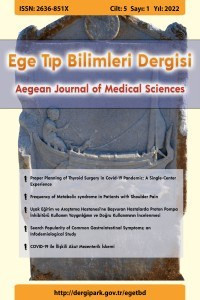Genel Cerrahi Yoğun Bakımda Postoperatif Dönemde Uzamış Yatış Süresine Etki Eden Faktörler
uzamış yatış, yoğun bakım, genel cerrahi
Factors Affecting Prolonged Stay in Postoperative Period in General Surgery Intensive Care Unit
prolonged stay, intensive care unit, general surgery,
___
- Referans 1. Combes A, Costa MA, Trouillet JL, Baudot J, Mokhtari M, Gibert C et al. Morbidity, mortality, and quality-of-life outcomes of patients requiring > or = 14 days of mechanical ventilation. Crit Care Med 2003;31:1373-81.
- Referans 2. Wong DT, Gomez M, McGuire GP, Kavanagh B. Utilization of intensive care unit days in a Canadian medical-surgical intensive care unit. Crit Care Med 1999;27:1319-24.
- Referans 3. Heyland DK, Konopad E, Noseworthy TW, Johnston R, Gafni A. Is it ’worthwhile’ to continue treating patients with a prolonged stay (>14 days) in the ICU? An economic evaluation. Chest 1998;114:192-8.
- Referans 4. Weissman C: Analyzing the impact of long-term patients on ICU bed utilization. Intensive Care Med 2000, 26:1319-1325.
- Referans 5. Martin CM, Hill AD, Burns K, Chen LM: Characteristics and outcomes for critically ill patients with prolonged intensive care unit stays.
- Referans 6. Trottier V, McKenney MG, Beninati M, Manning R, Schulman CI: Survival after prolonged length of stay in a trauma intensive care unit. J Trauma 2007, 62:147-150.
- Referans 7. Arabi Y, Venkatesh S, Haddad S, Al Shimemeri A, Al Malik S. A prospective study of prolonged stay in the intensive care unit: predictors and impact on resource utilization. Int J Qual Health Care. 2002 Oct;14(5):403-10.
- Referans 8. Zampieri FG, Ladeira JP, Park M, Haib D, Pastore CL, Santoro CM et al. Admission factors associated with prolonged (>14 days) intensive care unit stay. J Crit Care. 2014 Feb;29(1):60-5
- Referans 9. Chang CJ, Tam HP, Ko WJ, Tsai PR. Predicting hospital mortality in adult patients with prolonged stay (>14 days) in surgical intensive care unit. Minerva Anestesiol. 2013 Aug;79(8):843-52. Epub 2013 May 23.
- Referans 10. Higgins TL, McGee WT, Steingrub JS, et al. Early indicators of prolonged intensive care unit stay: impact of illness severity, physician staffing, and pre-intensive care unit length of stay. Crit Care Med 2003;31:45–51.
- Referans 11. Kramer AA, Zimmerman JE. A predictive model for the early identification of patients at risk for a prolonged intensive care unit length of stay. BMC Med Inform Decis Mak. 2010 May 13;10:27
- Referans 12. Bickenbach J, Fries M, Rex S, Stitz C, Heussen N, Rossaint R et al. Outcome and mortality risk factors in long-term treated ICU patients: a retrospective analysis, Minerva An- estesiol 2011;77:427-38.
- ISSN: 2636-851X
- Yayın Aralığı: Yılda 3 Sayı
- Başlangıç: 2018
- Yayıncı: Uşak Cerrahi Derneği
Travmatik Beyin Hasarı Rehabilitasyonu
Preeklampsiye Sekonder Posterior Reversible Ensefalopati Sendromu (PRES): Olgu Sunumu
Ökkeş Hakan MİNİKSAR, Aytaç YÜCEL, Mustafa Said AYDOĞAN, Füsun KAYA, Türkan TOĞAL
Tıp Dili ve Türkçe Üzerine Öğretim Üyesi Görüşleri
Genel Cerrahi Yoğun Bakımda Postoperatif Dönemde Uzamış Yatış Süresine Etki Eden Faktörler
Mehmet ÜSTÜN, Gizem KILINÇ, Avni Can KARACA, Halit Batuhan DEMİR, Nimet ŞENOĞLU, Cengiz AYDIN
Erkeklerde Memede Kitlenin Nadir Bir Nedeni, Idiopatik Granülomatöz Mastit
Semra DEMİRLİ ATICI, Semra SALİMOĞLU, Gülen GÜL, Cengiz AYDIN
Karaciğer Sirozu Olan Hastalarda Safra Kesesi Taşı Sıklığı
Kenan KOŞAR, Cevdet DURAN, Sevil FİŞEKÇİ OKTAR
Halsizlik ve Yorgunluğa Klinik Yaklaşım
Gonartrozda İntra-artiküler Hyalüronik Asid Enjeksiyonunun Kısa Dönem Etkinliği
Nilay ŞAHİN, Serdar SARGIN, Fatih CESME, Demirhan DIRAÇOĞLU, Cihan AKSOY
Erişkinde Farklı Klinik Bulgularla Seyreden Split Kord Malformasyonu Olguları
